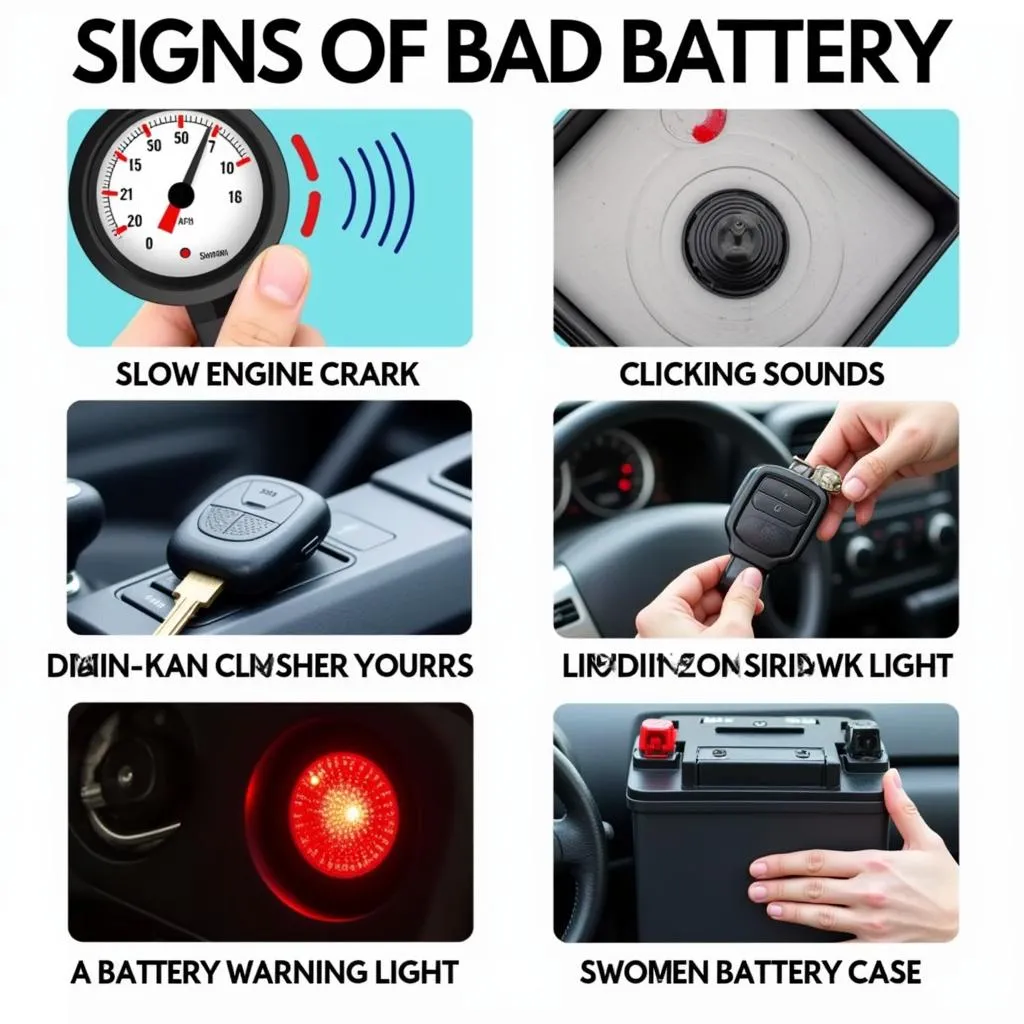A dead battery is one of the most common causes of car starting problems. But can a bad battery, one that’s not completely drained, also prevent your car from starting? In short, absolutely. Let’s dive into the connection between your battery and starter and find out why a faulty battery might be the culprit behind your car’s starting woes.
How Your Car Battery and Starter Work Together
To understand how a battery can affect your starter, it’s helpful to know a little bit about how they work together. Your car battery acts like a big energy reserve, storing electrical power. When you turn the key in the ignition, the battery sends a jolt of electricity to the starter motor. This motor is responsible for turning the engine over, which is the first step in getting your car running.
Signs of a Bad Battery Causing Starter Problems
Here’s where things get tricky. A completely dead battery is obvious – you’ll hear nothing when you turn the key. A failing battery, however, can present a range of symptoms that often mimic other car problems:
- Slow Engine Crank: Your engine might sound sluggish and take longer than usual to turn over.
- Clicking Sounds: When you turn the key, you might hear a rapid clicking noise coming from the starter.
- Dashboard Lights Flicker or Dim: The battery may not have enough power to keep your dashboard lights at full brightness.
- Battery Warning Light: This warning light on your dashboard is a clear indicator of a potential battery issue.
- Swollen Battery Case: Visually inspect your battery – if the case appears swollen or bloated, it’s likely failing and needs replacement.
 Symptoms of a Bad Car Battery
Symptoms of a Bad Car Battery
Why a Bad Battery Can Cause Starter Problems
Several things can cause a car battery to go bad, even if it’s not completely drained:
- Old Age: Car batteries have a limited lifespan, typically around 3-5 years.
- Extreme Temperatures: Both extreme heat and cold can shorten the life of your battery.
- Corrosion: A buildup of corrosion on the battery terminals can disrupt the flow of electricity.
- Parasitic Drain: A “parasitic drain” occurs when something in your car is drawing power from the battery even when the engine is off. This could be a faulty component or something as simple as leaving your headlights on.
- Alternator Issues: If your alternator isn’t charging the battery properly, it can lead to a weakened battery and starting problems.
“It’s important to remember that car batteries don’t last forever,” says John Smith, ASE Certified Master Technician. “Regularly checking your battery’s health and replacing it when necessary can save you a lot of trouble in the long run.”
Can You Jump-Start a Car with a Bad Battery?
You might be able to jump-start a car with a bad battery as a temporary fix. However, if the battery is the root of the problem, your car will likely die again soon after you disconnect the jumper cables.
“Jump-starting should only be considered a temporary solution,” advises Sarah Jones, Lead Mechanic at AutoCare Center. “If your battery is failing, it’s crucial to have it inspected and replaced to avoid getting stranded.”
What to Do if You Suspect a Bad Battery
If you think your battery might be the cause of your starting problems, it’s best to take your car to a qualified mechanic. They can test your battery and charging system to pinpoint the source of the problem.
Bad starter vs bad battery can be tricky to diagnose, so it’s best to leave it to the professionals who have the tools and knowledge to get it right.
Conclusion
A bad battery can definitely cause starter problems. If you’re experiencing slow cranking, clicking sounds, or other electrical issues, don’t ignore them. Get your battery checked and enjoy peace of mind knowing your car will start when you need it most.
Remember, a little preventative maintenance can go a long way in keeping your car running smoothly for years to come.